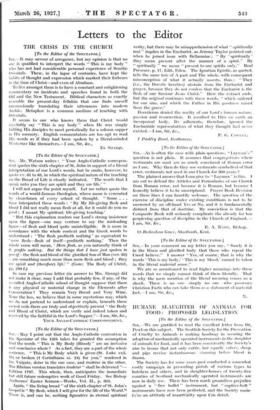[To the Editor of the SPECTATOR.] SIR.—May I point out
that the Anglo-Catholic contention in the Spectator of the 12th takes for granted the assumption that the words " This is My Body (Blood) " are an inclusive and conclusive whole ? As a fact, they are a part of the whole sentence. " This is My Body which is given (St. Luke xxii. 19) or broken (1 Corinthians xi. 24) for you," rendered in the Vulgate, datur in the one case, and tradetur in the other. The Rheims version translates tradetur " shall be delivered "- Edition 1797. This whole, then, anticipates the immediate but still future redemptive work of Good Friday. See Bishop Andrewes' Easter Sermon—Works, Vol. II., p. 303.
Again, "the living bread " of the sixth chapter of St. John's Gospel is " My flesh, which I will give for the life of the World." There is, and can be, nothing figurative in eternal spiritual verity, but there may be misapprehension of what " spiritually real " implies in the Eucharist, as Jeremy Taylor pointed out, when he joined issue with Bellarmine ; " By ' spiritually ' they mean present after the manner of a spirit." By " spiritually " we mean " present to our spirits only." Real Presence, p. 17, Edit. Eden. The Ignatian Epistle, as quoted, tells the same tale of A part and The whole, with consequent misconception of what it actually asserts, thus : " They (i.e., the Docetic heretics) abstain from the Eucharist and prayer, because they do not confess that the Eucharist is the flesh of our Saviour Jesus Christ." Here the extract ends, but the original continues with these words, " which suffered for our sins, and which the Father in His goodness raised from the grave."
Doceticism denied the reality of our Lord's human nature, passion and resurrection. It ascribed to Hint on earth an incorporeal body. Its adherents, therefore, ignored the Eucharistic representatives of what they thought had never existed.—I am, Sir, &c., 7 Pashley Road, Eastbourne.
P. G. CAW LEY.






















































 Previous page
Previous page